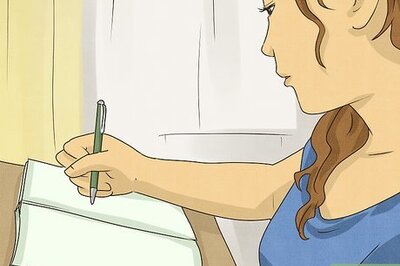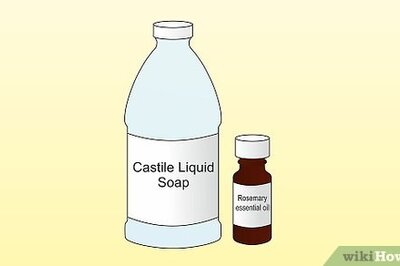
views
Glasgow (Scotland): Pushing purposefully through the crowd, Scotland’s first minister, Nicola Sturgeon, stops abruptly, her path blocked by a well-wisher cradling a photogenic 5-month-old. Without hesitation, Sturgeon gathers the baby smoothly in her arms and slowly plants a kiss on his forehead as the cameras click in unison.
Seen by many as Britain’s most effective party leader, Sturgeon is not even running in the December 12 general election because she sits in the Scottish Parliament in Edinburgh, not the British one at Westminster.
But as leader of the buoyant pro-independence and anti-Brexit Scottish National Party, she is the face of its campaign for Scotland’s 59 parliamentary seats in Westminster. The success of that campaign could determine whether Britain leaves the European Union in January — and, if it does, whether the United Kingdom survives the rupture.
At a recent and well-orchestrated visit to a charity in a gritty part of Glasgow, Sturgeon was everywhere, helping out at a numeracy class, performing a gym workout and, in the kitchen, ladling out bowls of thick lentil soup.
“This is definitely the most important general election we have had in Scotland in my lifetime because the future of our country is on the line,” she said once the food was served. “We are at a crossroads, and the outcome of this election will decide which path we go down and who decides our future.”
According to opinion polls, the Scottish National Party, which already holds 35 of Scotland’s British parliamentary seats, is poised to gain even more. If it takes enough votes from the Conservative Party, which holds 13 seats there, it could deprive Prime Minister Boris Johnson of the majority he needs to pursue Brexit.
If that were to happen, it could make Sturgeon a kingmaker, and her price for supporting a minority Labour government could be permission from that government to allow Scotland to hold another independence referendum. Scotland rejected independence in 2014, but Brexit has scrambled its politics since then.
Not so long ago, Labour was a dominant force in Scotland. But Sturgeon, who became party leader in 2014, scored a dramatic victory in the 2015 general election, when her party won all but three Scottish parliamentary seats. Some were then lost in a snap election two years ago.
While she has faced criticism over the quality of Scottish health and education, Sturgeon’s success is a symbol of how Scotland is diverging politically from England. Johnson’s pledge to “get Brexit done” has struck a chord with many there but often falls flat north of the border.
His shambling, confected upper-class English persona tends to go down badly with Scots, a majority of whom voted against Brexit in the 2016 referendum. And while Brexit is a critical political battleground in Scotland, for many it pales before the issue of Scottish independence.
Scots seem to be losing faith in their centuries-old union with England, with one recent survey showing that less than one-half of those polled said they thought the U.K. would survive in its current form for the next five years, and less than one-third expressed confidence that it would do so for the next decade.
“The ties that bind us together have weakened,” said Henry McLeish, a former first minister of Scotland and Labour Party politician. “If we weren’t part of the U.K. right now, would we want to join? I don’t think so.”
To advance her cause, Sturgeon’s party must win seats like Stirling, a large constituency with affluent towns, working-class communities and villages, where the fate of Scotland was determined in earlier times: at the Battle of Stirling Bridge in 1297, when William Wallace routed the English, and at the Battle of Bannockburn in 1314, when England’s Edward II was defeated.
So steeped is this place in history that the local Conservative Party’s motto is the old saying, “He who holds Stirling holds Scotland.”
Yet the Tories’ grip on Stirling could scarcely be more tenuous: They took the seat from the Scottish National Party in 2017 by just 148 votes. Johnson’s machinations to achieve Brexit have not added to their popularity there, but the situation is fluid, given the political crosscurrents of Brexit and the independence issue.
Knocking doors in Bannockburn, the Scottish National Party candidate, Alyn Smith, said his priority is to “stop Brexit and to focus on the things that matter to people here,” adding that Scots had lost faith in what they thought was a partnership of equals.
“The Brexit vote has brought home to a number of people that the U.K. doesn’t work the way you thought it does,” Smith said as he tried to persuade voters to open their doors on a dark, cold and rainy evening.
One who did — Christopher Wilson, a taxi driver — welcomed Smith into his home. “I never voted for Brexit; I voted to stay in the EU, and I feel that my voice is not being heard,” said Wilson, who also strongly favors Scottish independence.
But what if you are part of the large group of people who dislike Brexit but also, with the Conservatives, oppose Scottish independence?
On the scenic, undulating golf course at Bridge of Allan, a well-heeled town north of Stirling, Fiona Darroch, who is retired, said she will definitely not support the Scottish National Party, even though she is no Brexit enthusiast.
“In Scotland a majority don’t want to go out of the United Kingdom,” she said, walking down to the green. “England is our neighbor and our family. I don’t want a border,” added Darroch, who said that she would normally vote Conservative but planned this time to switch to pro-European Liberal Democrats.
Such defections could be lethal for the Conservative candidate, Stephen Kerr, but the focus on independence has given the Tories a lifeline even after a setback when their popular former leader in Scotland, Ruth Davidson, stepped down.
Kerr’s strategy is to court opponents of independence, even if they dislike Johnson and his no-holds-barred battle for Brexit. And Kerr said he is winning over working-class folk who were “never going to be Conservative voters — never — but are voting Conservative on the basis of lending me their support in order to protect the union.”
Conservatives can be more confident of holding another seat that Sturgeon’s party is targeting, Banff and Buchan, a coastal area north of Aberdeen, where their majority is 3,693. Support for Brexit was significant there in 2016, partly because of hopes that the fishing industry could gain from leaving the EU.
Inside the big fish market in the port town of Peterhead, the majority opinion is pro-Brexit, although Andrew Charles, who supports the Scottish National Party, said that under Johnson’s plan, the export part of his business would be uneconomical because of the added certification costs.
Graeme Smart, whose fishing vessel, the Shaulora, was moored outside, was among the 1 million Scots who voted for Brexit, and though his faith has weakened somewhat, he will probably support Johnson.
“He’s the U.K.’s Donald Trump,” Smart said as the Shaulora’s crew unloaded 65 boxes of prawns. “I wouldn’t believe a word the man says, but I would probably vote for him.”
Smart knows that leaving the EU is only the prelude to negotiating a trade deal with the bloc and that “the biggest problem is that once we get Brexit, we need a close relationship with Europe to sell our fish.”
But once again the conversation turns to the other big constitutional question.
“The SNP keeps saying that people want independence; the fishing industry doesn’t want independence,” Smart added, mindful that much of the fish landed here is consumed in England.
Across Scotland, focus on these two constitutional issues has put a further squeeze on the opposition Labour Party. In 2005, Labour won 41 Scottish seats but, a decade later, held just one in the 2015 election, though that rose to seven in 2017.
Labour is under pressure again, mainly because its relatively neutral policy on Brexit, and its grudging willingness to contemplate a second vote on Scottish independence, makes it sound fuzzy on the biggest two questions.
According to McLeish, Labour in Scotland lost traction to the Scottish National Party by underestimating it. “We became massively complacent,” he said.
In the final analysis, independence seems likely to rise on the Scottish agenda no matter who wins the election. If Labour deprives Johnson of a majority and needs the support of the Scottish National Party, that could open the way to a quick second independence referendum, while a Conservative sweep would lead to a Brexit that most Scots oppose.
“If Johnson and the Tories at Westminster continue to behave as they are,” said McLeish, “there’s not going to be any great day when we wake up with 60% in favor of independence, but we are going to drift slowly towards that outcome.”
Stephen Castle c.2019 The New York Times Company




















Comments
0 comment